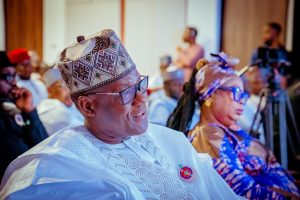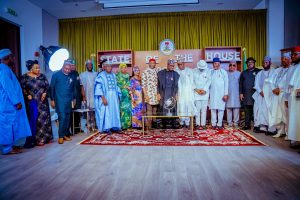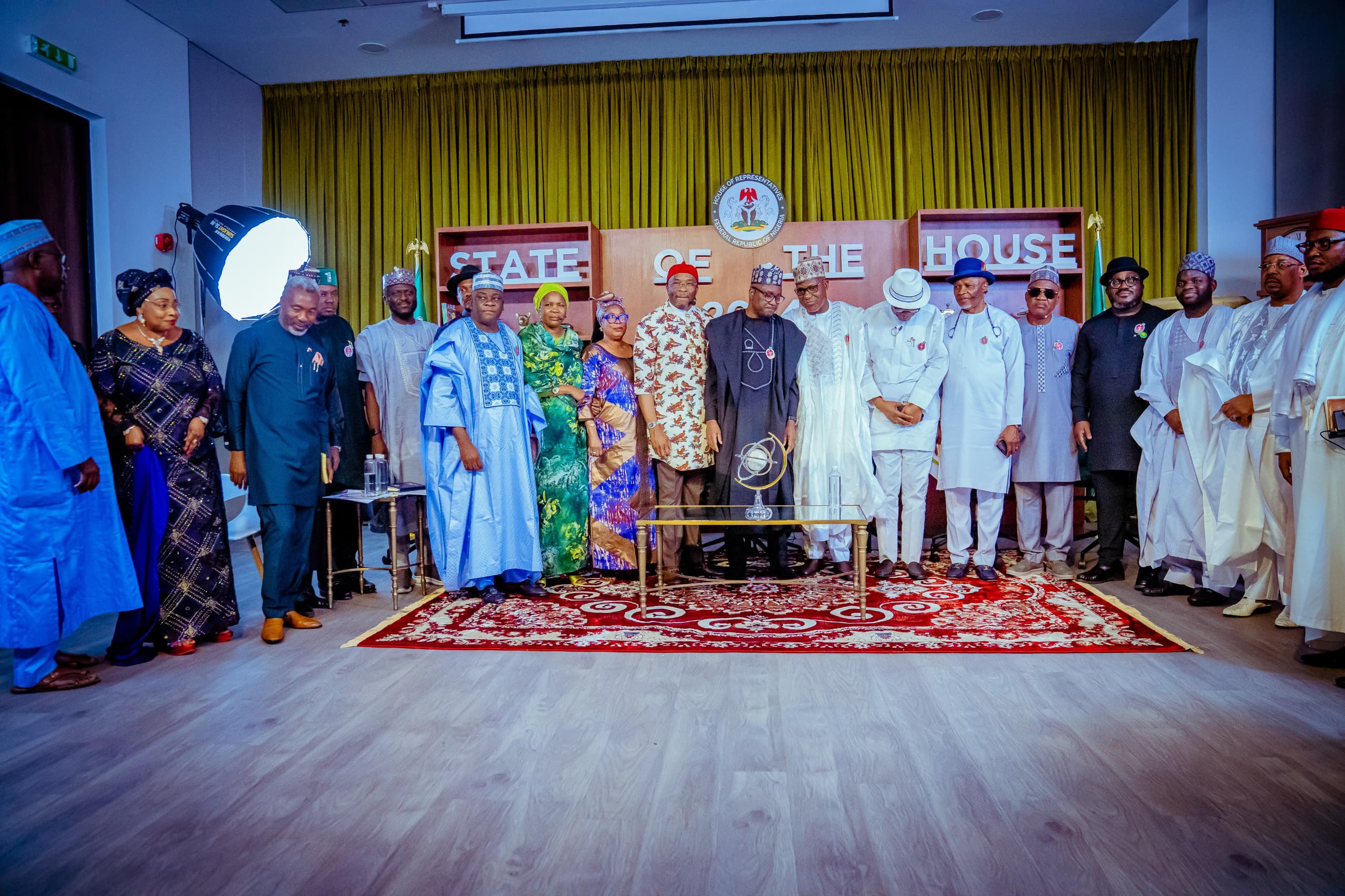… passed 89 Bills
… carried out several interventions on behalf of Nigerians
Apparently peeved by comments that the HoR is a rubber stamp, the House leadership last Friday at an interactive session with Nigerians declared that “our own House can never be a rubber stamp.
TheNewsGuru.com, TNG reports House Leader, Prof Julius Ihonvbere who represented the Speaker, Dr Tajudeen Abbas did not mince words while engaging participants at the citizens engagement when he declared that:
“The tax reform Bills with us has not passed second reading as we are adequately consulting all critical stakeholders to deliver good results.
“Describing the HoR as a rubber stamp is uncalled for and we cannot be one.
Speaking in the same vein, the Minority Leader, Rep Kingsley Chinda said: “Our approach to legislative inputs, outputs and actions is quite different.
“We don’t fight in the public, we engage ourselves at our executive sessions and if there’s need to exchange blows we exchange but we must disagree to agree on topical matters.
“And don’t forget, this is a unique tenth HoR with seven opposition parties unlike what’s obtainable in the past.
While reeling out the tenth HoR scorecard, the Speaker said:” Over the past 18 months, from July 2023 to December 2024, the House has shown unwavering dedication to its legislative agenda. Key achievements include the introduction of 1,351 bills, marking the highest number presented in any first session since 1999.
” From these, 89 bills were successfully passed, showcasing our commitment to legislative efficiency.
” Noteworthy among these are the Electricity Act (Amendment) Bill, 2023, which encourages investment in renewable energy and enhances the power sector’s efficiency; the Federal Audit Service Act (Amendment) Bill, 2023, which strengthens financial oversight and combats corruption; the Administration of Criminal Justice Act (Repeal and Enactment) Bill, 2023, which modernises our criminal justice system to ensure fairness and uphold human rights; and the Control of Small Arms and Light Weapons Bill, 2023, aimed at bolstering national security and curbing violence.
“Moreover, we have made significant advances in regional and sectoral development. The Niger Delta Development Commission Act (Amendment) Bill, 2023, and the South East Development Commission (Establishment) Bill, 2023, prioritise regional development and socio-economic growth.
“The Nigerian Medical Research Council (Establishment) Bill, 2023, fosters advancements in healthcare delivery. Social sector reforms include the Federal Fire and Rescue Service Bill, 2023, enhancing emergency response capabilities, and the Student Loans (Access to Higher Education) Act, 2024, addressing barriers to accessing tertiary education.
“The House has consistently demonstrated its commitment to oversight and public engagement. By July 2024, our committees had conducted numerous public hearings, processing a total of 679 motions of which 672 were referred to committees for further action, reflecting a vigorous legislative process.
” Furthermore, committees undertook 107 oversight visits to Ministries, Departments, and Agencies (MDAs), ensuring accountability and alignment with our legislative goals.
“Over the past year, the House addressed 240 public petitions and resolved forty cases, highlighting our responsiveness to the concerns of citizens.
“The 10th House has played a vital role in mediating conflicts, notably facilitating dialogues with the Nigerian Labour Congress (NLC) to avert nationwide strikes, resolving disputes with the Nigerian Teachers Union to minimise disruptions in the education sector, and engaging with the Nigerian Medical Association to address crucial healthcare issues.
” These interventions underscore our commitment to fostering harmony across various sectors.
In addition, we have actively advocated for gender equality and necessary constitutional reforms.
” The House has championed increased representation of women in governance and partnered with organizations such as UN Women to promote gender equality.
“On 10th October 2024, in a symbolic gesture, the Speaker vacated his seat for a 16-year-old girl to commemorate the International Day of the Girl Child.
” The constitutional review committee, led by the Deputy Speaker, continues its engagement with stakeholders on pivotal issues, including local government autonomy, electoral reform, and judicial independence.
“On 18th December 2024, President Ahmed Tinubu, GCFR, presented the 2025 Appropriation Bill to the National Assembly. The House has committed it to committee review and will host a Town Hall in January 2025 to gather public input, ensuring that the budget aligns with the needs of Nigerians.
” We recognize the economic challenges arising from recent reforms, including removing subsidies. In solidarity with the Nigerian populace, Members have willingly relinquished 50% of their salaries to support government efforts to mitigate these challenges’ impact.
READ FULL PRESENTATION BELOW:
Fellow Nigerians, it is with great humility that I, on behalf of the Speaker of the House of Representatives, Rt. Hon. Abbas Tajudeen, GCON, and the leadership of the House, warmly welcome you to this important interactive session. Today, we come together to engage with you— the very citizens we represent— to share insights on our legislative activities since the mid-year presentation of our scorecard.
This session embodies our commitment to an open parliament, where active citizen participation is pivotal in shaping our legislative journey.
I want to express our heartfelt gratitude to our partners, especially the Ford Foundation, the National Assembly Library Trust Fund, and the Nigerian Television Authority (NTA), for their invaluable support in making this programme a reality.
In July 2024, the House of Representatives hosted a week-long “Open Parliament” initiative, where we presented our legislative scorecard and invited Nigerians from diverse backgrounds to evaluate our efforts, share their perspectives, and provide constructive suggestions.
The feedback gathered was instrumental in refining our operations, particularly in oversight, constituency outreach, constitutional review, and representation.
The positive outcomes of this initiative have inspired today’s ‘State of the House’ interactive session— a platform to update you on our progress and extend our best wishes for the upcoming year.
This session serves multiple objectives: first, to provide a thorough update on our activities since our last gathering; second, to convey our sincere appreciation for the invaluable support and feedback we have received from citizens through public hearings, constituency interactions, and various channels; and lastly, to reaffirm our steadfast commitment to transparency, accountability, and inclusiveness.

We stand before you today because you have entrusted us with the vital responsibility of voicing your concerns; democracy thrives when the public actively engages.
Over the past 18 months, from July 2023 to December 2024, the House has shown unwavering dedication to its legislative agenda. Key achievements include the introduction of 1,351 bills, marking the highest number presented in any first session since 1999.
From these, 89 bills were successfully passed, showcasing our commitment to legislative efficiency. Noteworthy among these are the Electricity Act (Amendment) Bill, 2023, which encourages investment in renewable energy and enhances the power sector’s efficiency; the Federal Audit Service Act (Amendment) Bill, 2023, which strengthens financial oversight and combats corruption; the Administration of Criminal Justice Act (Repeal and Enactment) Bill, 2023, which modernises our criminal justice system to ensure fairness and uphold human rights; and the Control of Small Arms and Light Weapons Bill, 2023, aimed at bolstering national security and curbing violence.
Moreover, we have made significant advances in regional and sectoral development. The Niger Delta Development Commission Act (Amendment) Bill, 2023, and the South East Development Commission (Establishment) Bill, 2023, prioritise regional development and socio-economic growth.

The Nigerian Medical Research Council (Establishment) Bill, 2023, fosters advancements in healthcare delivery. Social sector reforms include the Federal Fire and Rescue Service Bill, 2023, enhancing emergency response capabilities, and the Student Loans (Access to Higher Education) Act, 2024, addressing barriers to accessing tertiary education.
The House has consistently demonstrated its commitment to oversight and public engagement. By July 2024, our committees had conducted numerous public hearings, processing a total of 679 motions of which 672 were referred to committees for further action, reflecting a vigorous legislative process. Furthermore, committees undertook 107 oversight visits to Ministries, Departments, and Agencies (MDAs), ensuring accountability and alignment with our legislative goals.
Over the past year, the House addressed 240 public petitions and resolved forty cases, highlighting our responsiveness to the concerns of citizens.
The 10th House has played a vital role in mediating conflicts, notably facilitating dialogues with the Nigerian Labour Congress (NLC) to avert nationwide strikes, resolving disputes with the Nigerian Teachers Union to minimise disruptions in the education sector, and engaging with the Nigerian Medical Association to address crucial healthcare issues.
” These interventions underscore our commitment to fostering harmony across various sectors.
In addition, we have actively advocated for gender equality and necessary constitutional reforms.
” The House has championed increased representation of women in governance and partnered with organizations such as UN Women to promote gender equality.
“On 10th October 2024, in a symbolic gesture, the Speaker vacated his seat for a 16-year-old girl to commemorate the International Day of the Girl Child.
” The constitutional review committee, led by the Deputy Speaker, continues its engagement with stakeholders on pivotal issues, including local government autonomy, electoral reform, and judicial independence.
“On 18th December 2024, President Ahmed Tinubu, GCFR, presented the 2025 Appropriation Bill to the National Assembly. The House has committed it to committee review and will host a Town Hall in January 2025 to gather public input, ensuring that the budget aligns with the needs of Nigerians.
” We recognize the economic challenges arising from recent reforms, including removing subsidies. In solidarity with the Nigerian populace, Members have willingly relinquished 50% of their salaries to support government efforts to mitigate these challenges’ impact.
“Such sacrifices are essential for building a self-reliant and prosperous nation, and we remain dedicated to alleviating the burden our citizens face.
“As we open the floor for your questions, I assure you that the House of Representatives will remain steadfast in our commitment to the welfare of all Nigerians.
“Together, we will navigate these challenges and work towards building a stronger, more resilient nation. I welcome you again to this interactive session on behalf of the Speaker and the entire House leadership. Let the dialogue commence.
